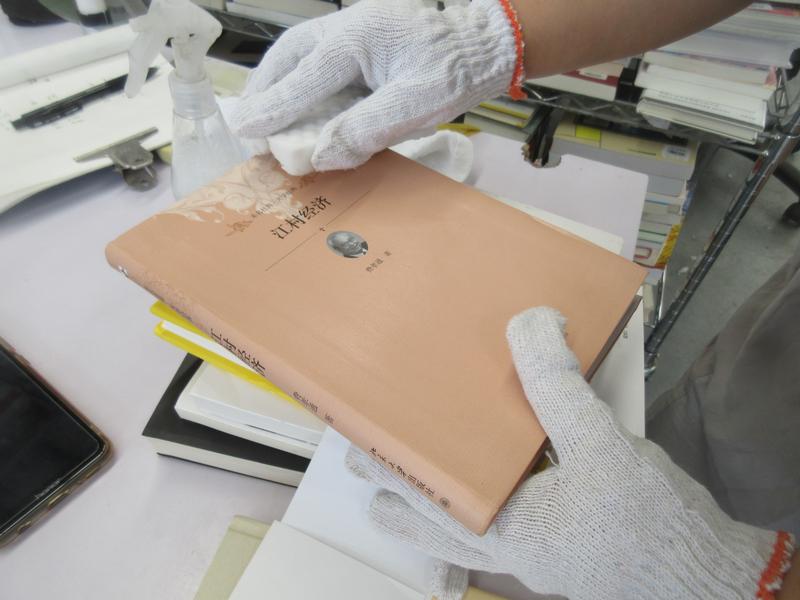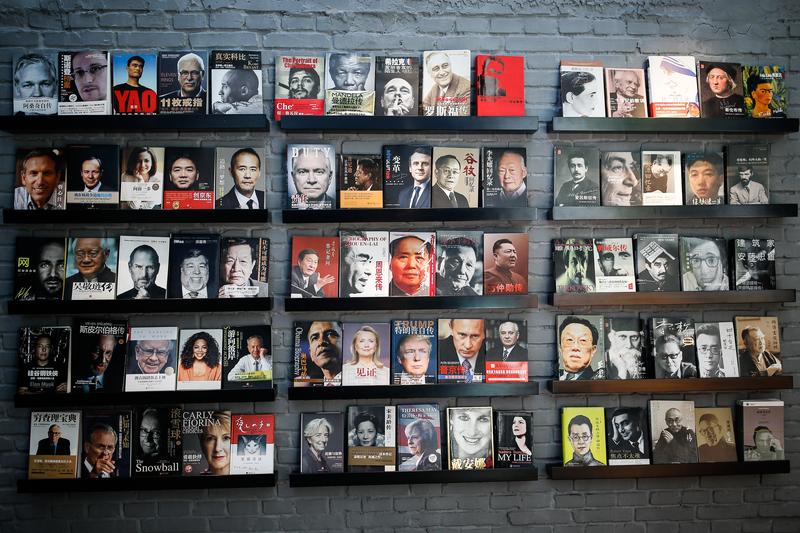 (PHOTO / CHINA DAILY)
(PHOTO / CHINA DAILY)
After squeezing herself into an overcrowded subway car at Beijing South Railway Station at 9 am, Gao Xiang, 25, took The Art of Loving by psychoanalyst and social philosopher Erich Fromm out of her bag to read, despite not having a seat.
Founded in 2017, Duozhuayu now has a 6,000-square-meter warehouse in Tianjin to examine, refurbish and store used books
Thirty minutes later, when she got off at Xizhimen Station, Gao had read 20 pages. Commuting on the subway has given her a regular reading break since she graduated from college in 2016.
She bought The Art of Loving on Duozhuayu, an online used-book recycling and sales site, and plans to sell the book back to the platform after finishing it.
Young readers have become a major book-buying force in China, and they are raising the circulation of used books.
Gao, a project manager in foreign trade, initially planned to spend 100 yuan ($14.55) a month on books. But for the past three months, she has spent more than 500 yuan each month-about 7 percent of her income.
"I used to buy new books on online platforms such as Amazon or Dangdang. Since my friends recommended that I use Duozhuayu two years ago, it has become my main platform to buy books," she said.
Gao thinks used books are reasonably priced and generally in an acceptable state, as the seller refurbishes them and uses labels to state their condition.
"There are different versions and conditions of books, with a range of prices. If a book has stain marks or something written on it, you will know about this before you receive it," she said.
ALSO READ: Bookstores sell more than just books
Founded in 2017, Duozhuayu now has a 6,000-square-meter warehouse in Tianjin to examine, refurbish and store used books.
Chen Qiulin, 24, a staff member at the warehouse, said a recycled used book must undergo a four-step refurbishing process before it goes back on the bookshelf.
"The first step is cleaning. Some 50 percent of the recycled books are in quite good condition, and 3 to 5 percent are brand new, so each of our workers can clean about 200 books an hour," Chen said.
 Duozhuayu workers clean used books for resale online. (PHOTO / CHINA DAILY)
Duozhuayu workers clean used books for resale online. (PHOTO / CHINA DAILY)
The second step is polishing the edges, before the books are sent to a disinfection room. "They remain there for 60 to 85 minutes for ozone disinfection. This room can hold 2,000 books at a time," Chen said.
The final step is the addition of plastic packaging for each book before it is ready to be delivered to the reader.
"We have about 25 workers in all four processes, and they can now handle about 14,000 books a day," Chen added.
 Duozhuayu workers clean used books for resale online. (PHOTO / CHINA DAILY)
Duozhuayu workers clean used books for resale online. (PHOTO / CHINA DAILY)
Yan Shen, 23, who works for a film company, enjoys receiving refurbished books from Duozhuayu, as she loves to read used ones.
"For some new books, it's not easy to flip the pages over, but for used books, it's usually smooth," Yan said. "Also, when you see remarks written on the pages, you feel connected to the previous owner, which seems romantic to me."
Yan places two to three orders with Duozhuayu each month, and as her collection of books mounts, she plans to sell some of them back to the platform.
Gao has already started to resell books, but has only selected those she thinks she won't reread. Using her phone, she scans the bar codes of those she wants to sell on Duozhuayu's WeChat progam, and it tells her whether a certain book has been recycled by the platform, and the purchasing price.
A courier visits her home to collect the books and take them to the warehouse in Tianjin. After a book is checked, Gao receives payment.
Chen is responsible for a book's final check. He said that three out of 100 books are rejected, mainly because they are pirated.
 While modern bookstore chains are busy examining how they can increase their engagement with readers, smaller, independent outlets are taking on the role of book selectors for their customers. (PHOTO / CHINA DAILY)
While modern bookstore chains are busy examining how they can increase their engagement with readers, smaller, independent outlets are taking on the role of book selectors for their customers. (PHOTO / CHINA DAILY)
"We record different versions of pirated books and also trace the legitimate version so that we can identify pirated copies," Chen said. "Take Miracles of the Namiya General Store (a 2012 Japanese novel by Keigo Higashino) as an example. The inside cover of the legitimate version has a wrinkle effect, whilst the pirated version does not."
Books that are rejected can be taken back by the users. If they choose not to, the books are destroyed.
Chen said the warehouse receives about 14,000 books and sells 12,000 to 13,000 each day. "Even though we can sell most of the books, with about 1,000 surplus ones each day, we now have almost 1 million books in storage," he said.
Bai Dongyan, Duozhuayu's marketing business development operator, said that in 2017 when the platform was founded, it recycled 120,000 books and sold 110,000. Last year, it recycled 2.9 million books and sold 2.3 million.
Bai said that to reduce storage, Duozhuayu launched a pop-up offline book store last year. It also started a project to enable readers to get books that are not recycled by the platform for free. Payment is only made for the shipment.
"Our rule is to recycle books that can be sold. Recently, we decided not to recycle books that were used by libraries," she said.
"The top three categories for both recycling and sales are literature, social science and art. Books about young people, relationships and careers are in high demand," she said. "Detective fiction is the most popular, but we suggest that sellers do not reveal the killer's name on the title page!"
READ MORE: Economic reforms boost vigor of bookstores in the country
Duozhuayu's sales data for last year show that books about economics sold quickly, while there was an oversupply of works about parenting.
Last year, the top 10 popular writers on Duozhuayu included Higashino, who in addition to Miracles of the Namiya General Store wrote The Devotion of Suspect X, fellow Japanese author Haruki Murakami, who wrote 1Q84 and Norwegian Wood, and Chinese writers Louis Cha Leung-yung and Yu Hua.
The top three least popular were Chinese authors Guo Jingming, Han Han and Anni Baobei, who all write pop fiction.
"But the data we collect are from our recycled books, not the retail market, and some books have been published in different versions many times, which can be a reason for them becoming 'inactive'," Bai said. "It does not necessarily mean they are not popular anymore.
"Some 75 percent of our users are under 30 and come from first-tier cities. They are mostly students, freelancers and internet company employees."
Like Duozhuayu, Manyoujing is also a used-book customer-to-business-to-customer platform, and was founded last year.
But it does not pay its users in cash. When users sell books to Manyoujing, the platform gives them points that equate to the original price of a book.
The points can be used to buy books on the platform.
Founded in Chengdu, Sichuan province, Manyoujing now has more than 2 million registered users.
Founder Wang Long said in an interview with technology media website 36kr that 70 percent of its users are both buyers and sellers, and 90 percent of the books that are collected can be sold in 30 days.
"We have noticed a demand among young people for reading by exchange-to read more books without paying more money" Wang said.
In addition to Duozhuayu and Manyoujing, there are customer-to-customer online platforms for used books such as Confucius and the flea market platforms Xianyu and Zhuanzhuan.
Confucius, founded in 2002, is now one of the largest online used-book platforms and features old titles that are worth collecting. It has attracted more than 10,000 bookstores and over 30,000 booksellers.
In Beijing, secondhand bookstores are no longer easy to find, as young people prefer to strike deals online. Used books offline can be found at the Panjiayuan Antique Market each weekend and at the book fair in Temple of Earth park, which is held several times a week.
According to a report on Chinese reading habits last year, released by Alibaba in January, reselling used books and also giving them away, boomed on Xianyu. People in Guangdong province topped the list for traded or giveaway books, with 1.59 books per person on average, followed by Shanghai residents with 1.11 books and those in Beijing with 1.08.


